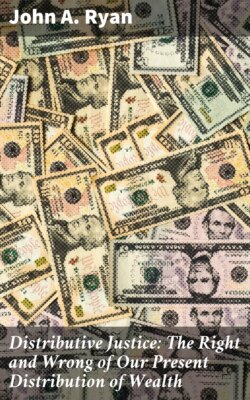Читать книгу Distributive Justice: The Right and Wrong of Our Present Distribution of Wealth - John A. Ryan - Страница 9
На сайте Литреса книга снята с продажи.
The Cause of Economic Rent
ОглавлениеTable of Contents
The cause of economic rent is the fact that land is limited relatively to the demand for it. If land were as plentiful as air mere ownership of some portion of it would not enable the owner to collect rent. As landowner he would receive no income. If he cultivated his land himself the return therefrom would not exceed normal compensation for his labour, and normal interest on his capital. Since no one would be compelled to pay for the use of land, competition among the different cultivators would keep the price of their product so low that it would merely reimburse them for their expenditures of capital and labour. In similar conditions no rent would arise on building sites. The cause of the amount of rent may also be stated in terms of scarcity. At any given time and place, the rent of a piece of land will be determined by the supply of that kind of land relatively to the demand for it. However, the demand itself will be regulated by the fertility or by the location of the land in question. Two pieces of agricultural land equally distant from a city, but of varying fertility, will yield different rents because of this difference in natural productiveness. Two pieces of ground of equal natural adaptability for building sites, but at unequal distances from the centre of a city, will produce different rents on account of their difference of location. The absolute scarcity of land is, of course, fixed by nature; its relative scarcity is the result of human activities and desires.
The definition of rent adopted in these pages, "what men are willing to pay for the use of land," or, "what land is worth for use," is simpler and more concrete, though possibly less scientific, than those ordinarily found in manuals of economics, namely: "that portion of the product that remains after all the usual expenditures for labour, capital, and directive ability have been deducted;" or, "the surplus which any piece of land yields over the poorest land devoted to the same use, when the return from the latter is only sufficient to cover the usual expenses of production."
The statement that all rent goes to the landowner supposes that, in the case of hired land, the tenant pays the full amount that would result from competitive bidding. Evidently this was not the case under the feudal system, when rents were fixed by custom and remained stationary for centuries. Even to-day, competition is not perfect, and men often obtain the use of land for less than they or others might have been willing to give. But the statement in question does describe what tends to happen in a system of competitive rents.
Before discussing the morality of the landowner's income, and of rent receiving, we may with profit glance at the history of land tenure. Thus we shall get some idea, first, of the antiquity of the present system, and, second, of its effects upon individual and social welfare. Both these considerations have an important bearing upon the moral problem; for length of existence creates a presumption in favour of the social, and therefore the moral, value of any institution; and past experience is our chief means of determining whether an institution is likely to be socially beneficial, and therefore morally right, in the future.
